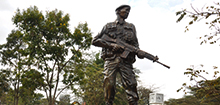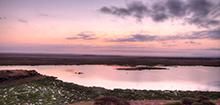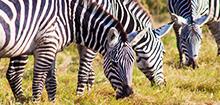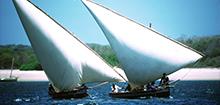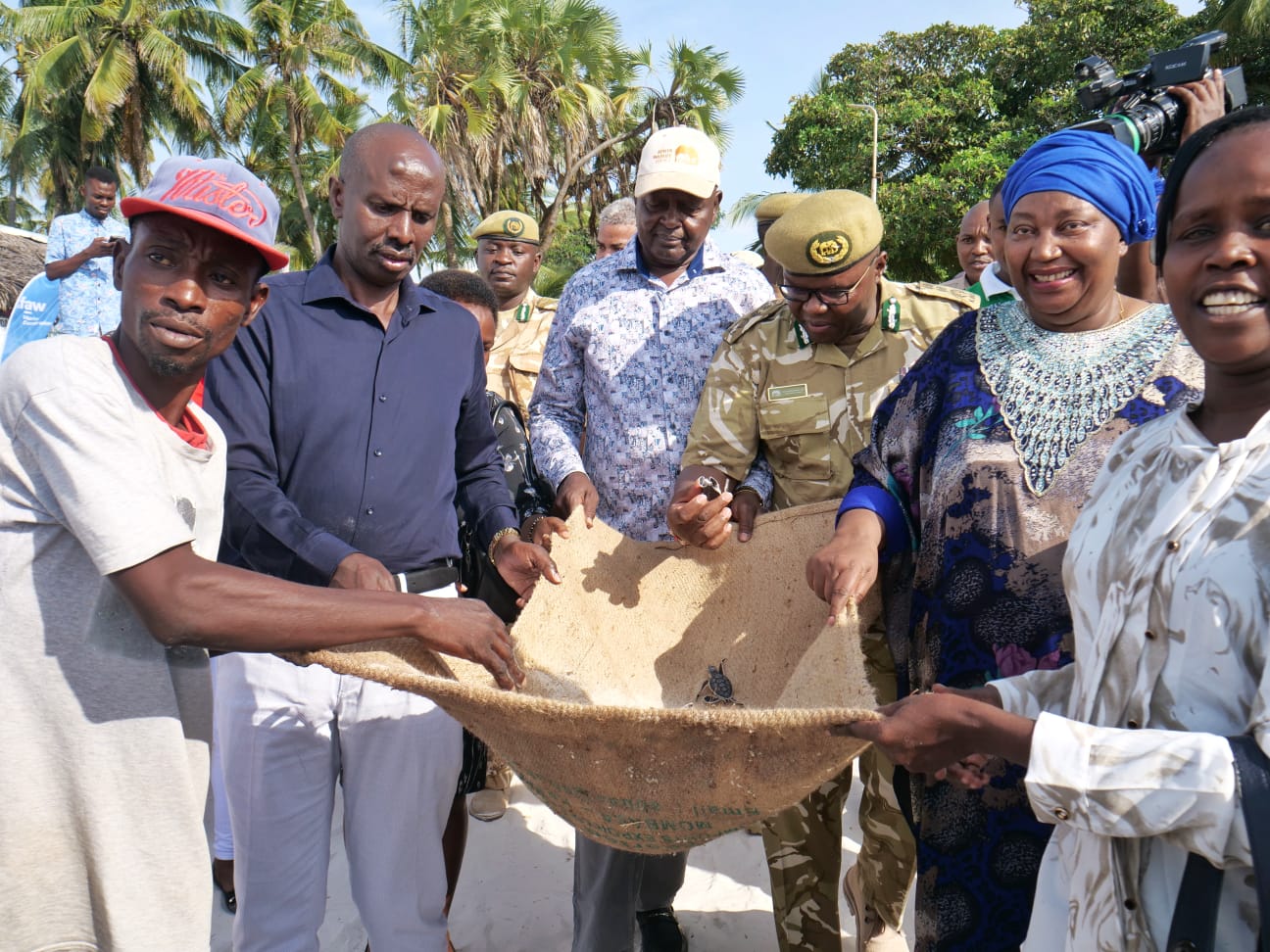
Date Published:
The Ministry of Tourism, Wildlife and Heritage led the Kenya Wildlife Service (KWS) and a plethora of conservation partners in celebrating World Sea Turtle Day, Friday, 16th June 2023, at Nyali Beach in Mombasa.
The commemoration kicked off with the release of 148 endangered green sea turtle hatchlings from their nesting sites on the beach to the ocean, followed by a comprehensive beach clean-up, led by tourism Chief Administrative Secretary Wilson Sossion, accompanied by KWS acting Director General Dr. Erustus Kanga and Principal Research Scientist at Wildlife Training and Research Institute Dr. Mohammed Omar, among other government officials and stakeholders. This hands-on participation in beach clean-up and other activities related to the day gave new meaning to the phrase, ‘unity in conservation.’
Addressing the sea turtle enthusiasts gathered for the annual commemoration, tourism CAS Wilson Sossion, said that sea turtles are considered a flagship species, playing a critical role in Kenya’s marine ecosystem, as well as a tourist attraction, adding that out of the five species documented as occurring within Kenyan waters, two are critically endangered while three are endangered under the IUCN Red List. The green turtles – the most common species, are frequently reported to nest along Kenya’s coastline and are also among the most exploited species, leading to drastic decline in their population. He added that, from scientific evidence, the hatchlings released on World Sea Turtle Day would migrate as far as South Africa and Indonesia before returning to their point of release to lay eggs, after 20 years. He stressed the dire need for their protection along every point of migration.
Mr. Sossion explained that challenges faced by sea turtles include illegal harvesting for meat, oils and eggs, fisheries by catch, coastal development, climate change, pollution from land-based sources, degradation and habitat loss. He expressed the Kenya Governments dedication to champion climate change effects and engage in measures that are going to reverse its effects. This has led global policy makers in conservation and protection of sea turtles, to enhance efforts, putting several legal protection instruments in place, as well as advancement in technological solutions to support the legal instruments and research. Mr. Sossion thanked KWS, and the Wildlife Research and Training institute (WRTI), averring that conservation must be supported by quality research data, in addition to disseminating such information to relevant industry players such as tour guides.
“If you look at our Kenya Constitution 2010, the Principle of Governance Article 10, it is through public participation,” tourism CAS said, lauding public involvement in the sea turtle conservation program, specifically the more than 10 Community Based Environmental Organizations present. Mr Sossion also said that, in a significant win for the spaces, CITES member states agreed to adopt a new resolution to commit government and ensure the prioritization of counter illegal trade measures of sea turtles, with an increase in law enforcement through new DNA tracking technologies and the use of forensics. “As a party to the Convention on Biological Diversity, which Kenya is a signatory to, we are committed as a government, to expand marine protected areas to 30% by the year 2030, based on a number of initiatives that are underway to create networks of marine protected areas that are critical sea turtle habitats,” he stated, noting that the establishment of a transboundary protected area with neighbouring Tanzania and other states was a plus for the sea turtle.
The CAS stated that International Union for the Conservation of Nature (IUCN) Important Marine Turtle Area (IMTA) guidelines, describe a methodology for identifying, defining and prioritizing global important areas for sea turtle conservation, adding that a reviewed Sea Turtle Strategy would soon be published, and also designate turtle nesting sites. He added that this might translate to removal of certain development structures along the coastline, guided by legislation and investor understanding. Mr. Sossion stated that the Ministry, in collaboration with concerned institutions, will continue to embrace community engagement, stakeholder involvement, conservation research and training as key components for addressing pressure on sea turtles and as an enabler for the national conservation of wildlife, towards realizing the wildlife strategy 2030 delivery.
Mr. Sossion thanked KWS, all representatives of government organizations, NGOs, conservation partners, including the representative of the UK’s ambassador to Kenya, lauding this global network of partnerships helping Kenya in the technical and resource areas in conservation. He said that the Kenya Kwanza government is extremely keen on conservation, underlined by the fact that Kenya’s His Excellency President William Ruto holds a doctorate in nature and conservation, as a botanist and zoologist. Areas of concern include: titling in areas that affect conservation and restoration of Kenya’s degraded national parks and marine conservation areas, lauding the Kenya Navy for its support to KWS.
KWS BoT Chair Lt. Gen Walter Raira Koipaton celebrated the sea turtle, stressing the importance of educating ourselves and the world on the importance of sea turtles in our ecosystems survival. He lamented the fact that sea turtles face an uncertain future due to their unsustainable harvesting and a host of other challenges, which are pushing several sea turtle species to the brink of extinction. He stressed on the importance of investing in the conservation of all biodiversity, both terrestrial and marine.
Lt. Gen. Koipaton cautioned that not all sea turtles are fit for human consumption; some are poisonous, and consumers must be aware of the potential for diseases and plagues through consumption of the wrong species. He stressed the need for simple, yet impactful actions to protect the sea turtle, specifically, committing to reducing the proliferation of single-use plastics, which pose a significant threat to sea turtles. He singled out the plastic bags used to hold tree seedlings, suggesting the use of coconut husks as an alternative, as they are not dangerous to sea turtles.
The KWS Board Chairman said that World Sea Turtle Day serves as a reminder of the urgent need to protect and conserve our beaches, adding that climate change mitigation, marine conservation, sustainable fishing practices and plastic pollution reduction requires a multifaceted approach such as the one demonstrated during the commemoration.
KWS acting Director General Dr. Erustus Kanga, expressed his gratitude for Kenya’s stunning biodiversity, both terrestrial and marine, which KWS is mandated to conserve as our national heritage. He reiterated that this year’s World Sea Turtle Day, guided by the theme, “keep them safe from plastic pollution,” underlined the necessity of keeping sea turtles safe from plastic pollution. The DG said it was regrettable that approximately eight tonnes of plastic are dumped in our oceans annually, posing a severe extinction threat to the sea turtles – six out of seven marine turtle species are on the brink of extinction, warning that the ‘business as usual’ approach to sea turtle conservation would indeed lead to their extinction.
Dr. Kanga averred that sea turtles have existed on Earth for millennia, surviving and adapting through countless challenges, making them a symbol of patience, and a reminder of a profound interconnectedness of all living things, including human beings. He stressed the need for KWS and partners to upscale sea turtle conservation efforts to reverse the threat to their survival engendered by human activities.
DG said that threats to the sea turtle include habitat loss, pollution, climate change and poaching, in addition to often being accidentally trapped in fishing gears, which can lead to injuries or death. Dr. Kanga encouraged the support of turtle conservation efforts, participating in regular beach clean-ups, reporting sea turtle sightings to relevant authorities and recycling and reducing use of plastics. “KWS continues to embrace collaborative conservation, by highlighting turtle conservation efforts and taking the lead in beach clean-ups. He thanked staff at KWS and partners for supporting this gallant endeavour of protecting sea turtle habitats.
What you can do to protect sea turtles and their habitats: become a conscientious and responsible seafood consumer by asking where and how your seafood was caught, and only consume seafood caught in ways that do not harm sea turtles; contact KWS, Kenya Coast Guard or community-based environmental conservation if you see a sick or injured turtle; support sea turtle conservation by active participation; reduce marine debris that may entangle or be accidentally eaten by sea turtles; participate in coastal clean-ups and reduce plastic use; carry reusable water bottles and shopping bags and refrain from releasing balloons; keep nesting beaches dark, undisturbed and safe for sea turtles; remove recreational beach equipment like chairs and umbrellas so that sea turtles are not turned away; fill in holes and knock down sand castles before you leave the beach and creating awareness – tell a friend to tell a friend about sea turtles.

